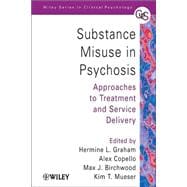
Note: Supplemental materials are not guaranteed with Rental or Used book purchases.
Purchase Benefits
What is included with this book?
Alex Copello is a consultant clinical psychologist, Head of the Psychology Addiction Speciality within Northern Birmingham Mental Health Trust, and Lecturer in Clinical Psychology at the School of Psychology, University of Birmingham. He is a practising clinician and the lead professional for the Addiction Research and Development Programme for the Trust. In addition, he is one of the principal investigators on an MRC-funded UK multisite study evaluating alcohol treatment. He has been involved in developing a social network-based treatment that will be evaluated in this study. His research and clinical interests include the impact of addiction upon families; the evaluation of services for alcohol and drug users, both in primary care and specialist settings; and the use of qualitative research methods. He has also been involved in international cross-cultural research assessing the impact of addiction on families in Mexico and Australia. He publishes extensively in a number of scientific journals and has co-authored the book Living with Drink: Women Who Live with Problem Drinkers (1998).
Max J. Birchwood is Director of the Early Intervention Service and Director of Research and Development for Northern Birmingham Mental Health Trust, and Professor of Mental Health at the University of Birmingham, UK. His clinical and research interests have centred around the development of methods of promoting individuals’ control over their psychotic symptoms, including the application of cognitive therapy to psychotic symptoms, as in acute psychosis, and the recognition and control of early warning signs of relapse. He has published widely in these areas and is a prominent figure within this field. His books include Psychological Management of Schizophrenia (1994), Cognitive Therapy for Hallucinations, Delusions and Paranoia (1996), Early Intervention in Psychosis (2000) and Schizophrenia (2001). He is currently involved in the development of community-based early intervention for people with psychosis across the UK and is patron to the National Schizophrenia Fellowship in the UK.
Kim T. Mueser is a Professor in the Departments of Psychiatry and Community and Family Medicine at the Dartmouth Medical School in New Hampshire, USA. He is an active contributor to research and the development of clinical methods for the treatment of comorbid severe mental illness and substance use, has published numerous articles within this area, and provides research consultancy/advice to a number of services. His clinical and research interests include research on the treatment of persons with severe mental illness, and substance use disorders, family treatment and social skills training for severe mental illness, and other aspects of psychiatric rehabilitation. He has co-authored several books, including Social Skills Training for Psychiatric Patients (1989), Coping With Schizophrenia: A Guide for Families (1994), Behavioural Family Therapy for Psychiatric Disorders, 2nd edn, 1999), and Social Skills Training for Schizophrenia (1997).
| About the Editors | |
| List of Contributors | |
| Preface | |
| Acknowledgements | |
| Social and Psychological Perspectives of Problem Substance Use Among those with Psychosis | |
| Introduction | |
| Substance Misuse in Psychosis: Contextual Issues | |
| Temporal Order and Aetiology | |
| Substance Misuse and Psychosis in Context. The Influences of Families and Social Networks | |
| Sociological Aspects of Substance Misuse among People with Severe Mental Illness | |
| A Cognitive Conceptualization of Concurrent Psychosis and Problem Drug and Alcohol Use | |
| Integrated Service Delivery Models | |
| Introduction | |
| Integrated Dual Disorder Treatment in New Hampshire(USA) | |
| The Combined Psychosis and Substance Use(COMPASS) Programme: An Integrated Shared-care Approach | |
| An Integrated Treatment Approach to Substance use in an Early Psychosis Programme | |
| An Inpatient-Based Service Model | |
| Treatments for Substance Misuse in Psychosis | |
| Introduction | |
| Assessment Considerations | |
| Cognitive-Behavioural Integrated Treatment Approach for Psychosis and Problem Substance Use | |
| Relapse Prevention for Patients with Bipolar and Substance Use Disorders | |
| Family Intervention for Substance Misuse in Psychosis | |
| Start Over and Survive: A Brief Intervention for Substance Misuse in Early Psychosis | |
| Pharmacological Management of Substance Misuse in Psychosis | |
| Special Populations | |
| Introduction | |
| Cannabis and First-Episode Psychosis: The CAP Project | |
| Comorbid severe Mental Health Problems and Substance Abuse in Forensic Populations | |
| Integrated Treatment Outcomes for Homeless Persons with Severe Mental Illness and Co-Occurring Substance Use Disorders | |
| Issues in Comorbidity and HIV/AIDS | |
| The Evolving Evidence Base | |
| Cochrane Review of Treatment Outcome Studies and its Implications for Future Developments | |
| Epilogue: Future Directions | |
| Concluding Remarks | |
| Index | |
| Table of Contents provided by Publisher. All Rights Reserved. |
The New copy of this book will include any supplemental materials advertised. Please check the title of the book to determine if it should include any access cards, study guides, lab manuals, CDs, etc.
The Used, Rental and eBook copies of this book are not guaranteed to include any supplemental materials. Typically, only the book itself is included. This is true even if the title states it includes any access cards, study guides, lab manuals, CDs, etc.